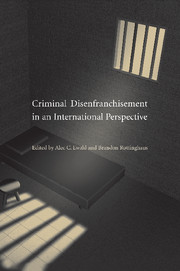Book contents
- Frontmatter
- Contents
- Contributors
- Foreword: Waves of Democracy and Criminal Disenfranchisement
- Acknowledgments
- Introduction
- Part I CONTEMPORARY DISENFRANCHISEMENT LAW
- Part II DISENFRANCHISEMENT IN COMPARATIVE PERSPECTIVE: LEGAL AND POLITICAL APPROACHES
- Part III VOTING RIGHTS AND PEOPLE WITH CRIMINAL CONVICTIONS: CASE STUDIES
- 6 The Politics and Legality of Prisoner Disenfranchisement in Australian Federal Elections
- 7 The Campaign for Prisoner Voting Rights in Ireland
- 8 The Ballot as a Bulwark: Prisoners' Right to Vote in South Africa
- 9 The Right to Vote in Danish Prisons
- 10 In Defense of Prisoner Disenfranchisement
- Index
- References
7 - The Campaign for Prisoner Voting Rights in Ireland
Published online by Cambridge University Press: 03 July 2009
- Frontmatter
- Contents
- Contributors
- Foreword: Waves of Democracy and Criminal Disenfranchisement
- Acknowledgments
- Introduction
- Part I CONTEMPORARY DISENFRANCHISEMENT LAW
- Part II DISENFRANCHISEMENT IN COMPARATIVE PERSPECTIVE: LEGAL AND POLITICAL APPROACHES
- Part III VOTING RIGHTS AND PEOPLE WITH CRIMINAL CONVICTIONS: CASE STUDIES
- 6 The Politics and Legality of Prisoner Disenfranchisement in Australian Federal Elections
- 7 The Campaign for Prisoner Voting Rights in Ireland
- 8 The Ballot as a Bulwark: Prisoners' Right to Vote in South Africa
- 9 The Right to Vote in Danish Prisons
- 10 In Defense of Prisoner Disenfranchisement
- Index
- References
Summary
INTRODUCTION
Until the enactment of enabling legislation in 2006, Ireland occupied a strange no man's land in relation to the voting rights of its prisoners. Prisoners were not divested of these rights by legislation and therefore in theory continued to enjoy the right to vote under article 16 of the Irish Constitution. Indeed, as pointed out by the Supreme Court in Breathnach v. Ireland, the legislation that had been enacted in this area was in fact enabling prisoners' right to vote, allowing them to vote if given temporary release. Therefore, prior to 2006, the barrier that faced Irish prisoners in exercising the vote was not constitutional or legislative in nature. Rather, the difficulty was that successive governments had failed to provide an administrative means through which they could access a ballot, a situation that also extended to remand prisoners and those in prison for civil debt. The impediment to exercising the franchise for Irish prisoners was accordingly de facto, rather than de jure.
The first purpose of this chapter is to examine the legal history of the right of suffrage as it applies to prisoners in Ireland, tracing the development of voting rights from the initial ban on prisoners registering to vote in the 19th century to the unsuccessful Supreme Court challenge to the status quo in Breathnach. Ultimately, the catalyst for change in Ireland was to come from Europe, in the form of the recent decision of the European Court of Human Rights (ECHR) in Hirst v. United Kingdom.
- Type
- Chapter
- Information
- Criminal Disenfranchisement in an International Perspective , pp. 205 - 220Publisher: Cambridge University PressPrint publication year: 2009
References
- 3
- Cited by



